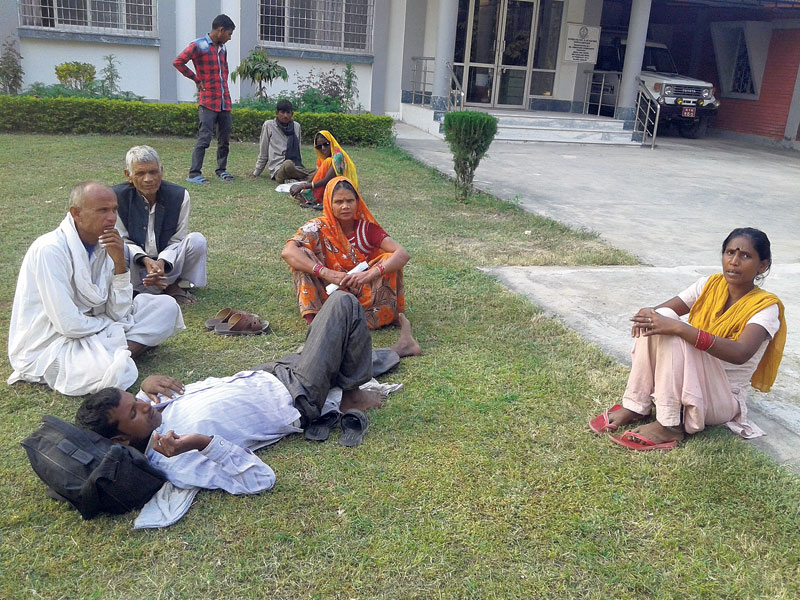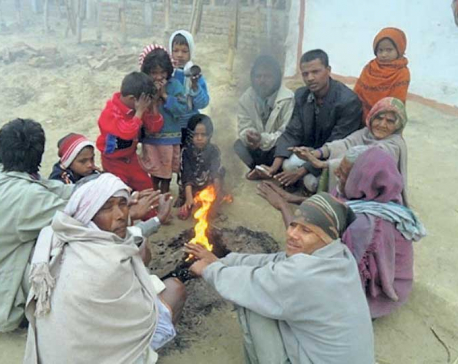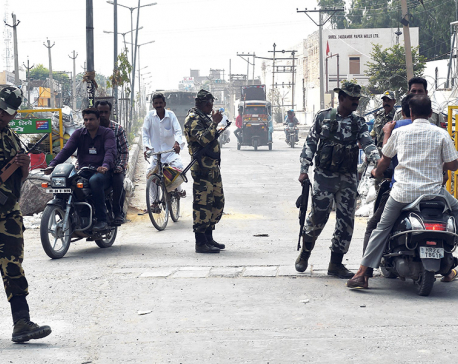
OR
Ban on high-value Indian banknotes hits Rupandehi life
Published On: November 11, 2016 08:17 AM NPT By: Rekha Bhusal

BHAIRAHAWA, Nov 10: India Prime Minister Narendra Modi’s announcement on Tuesday night that his government had withdrawn the legal tender of high-denomination Indian Rs 500 and IRs 1,000 dollar bank notes has started hitting daily life and business across Nepali border towns and villages.
Modi said the move was directed at curbing corruption and currency counterfeiting and would bring to light wealth hidden from Indian tax authorities, but its immediate effect has been to cause uncertainty among those dealing in Indian currency inside and outside India.
The market in both side of Rupandehi’s border with India’s Sunaili-Nautanwa used to start getting crowded early in the morning, but since Wednesday they have been wearing a deserted look.
The ban has also affected the daily-wage laborers who used to travel across the border. Locals near the border say they are confused about how to exchange IRs 500 and IRs 1,000 bills.
Ram Kumar Sharma, the president of Siddharthanagar Chamber of Commerce and Industries say the Indian government’s decision has already showed its effect in the markets near the border. According to him, Rupandehi used to record transactions of more than Rs 100 million daily.
Nepal Rastra Bank (NRB) Wednesday directed bank and financial institutions to stop exchanging 500 and 1,000-rupee Indian bills but NRB hasn’t said what is to be done with the now-banned bills. Revati Prasad Nepal, a director at NRB, says a decision will be made soon as NRB officials are in touch with officials of the Reserve Bank of India.
The ban has also affected the import and export of the goods. Traders say the export of some products from the Belhiya border has stopped. Most of the money exchanges in Lumbini are also closed. According to Lumbini Money Exchange Entrepreneurs Association, there are 45 money exchange businesses in Rupandehi. Gopal Bhandari, the president of the association, says the money exchange counters across the district have a huge stock of IRs 1,000 and IRs 500 bills.
The Indian move has also affected the tourism industry of Rupandehi which is centered around Lumbini.
The number of tourists arriving in Lumbini via the Belhiya border went down in Wednesday and Thursday. Mithunman Shrestha, a hotel operator in Lumbini, says Indian tourist numbers had been satisfactory in recent days, but since the ban it has gone down significantly.
Shrestha says Indian tourists who are already in Nepal have not been able to spend much. Shrestha says the ban will end up affecting Nepal’s economy and the tourism industry will suffer unless a proper decision is made quickly.
Just after ban was announced, black marketing of the bills has been reported. Traders and locals say a INRs 1,000-note -- valued at Rs 1,600 -- fetches Rs 1,300-Rs 1,400 while people are offering only Rs 300 to Rs 350 for a IRs 500-note -- technically equal to Rs 800.
You May Like This

Cold hits life hard in tarai districts
KATHMANDU, Jan 6: With the temperature continuing to dip each day, the biting cold of the winter has severely affected life... Read More...

Indian guru faces up to life in prison in rape case
NEW DELHI, August 28: Thousands of supporters of an Indian quasi-religious sect leader left his headquarters in northern India on... Read More...

RBI team's report to decide fate of scrapped Indian banknotes
KATHMANDU, March 2: A two-member team of Reserve Bank of India (RBI) has held discussions with the officials of Nepal Rastra... Read More...




Just In
- MoHP cautions docs working in govt hospitals not to work in private ones
- Over 400,000 tourists visited Mustang by road last year
- 19 hydropower projects to be showcased at investment summit
- Global oil and gold prices surge as Israel retaliates against Iran
- Sajha Yatayat cancels CEO appointment process for lack of candidates
- Govt padlocks Nepal Scouts’ property illegally occupied by NC lawmaker Deepak Khadka
- FWEAN meets with President Paudel to solicit support for women entrepreneurship
- Koshi provincial assembly passes resolution motion calling for special session by majority votes







_20220508065243.jpg)






Leave A Comment